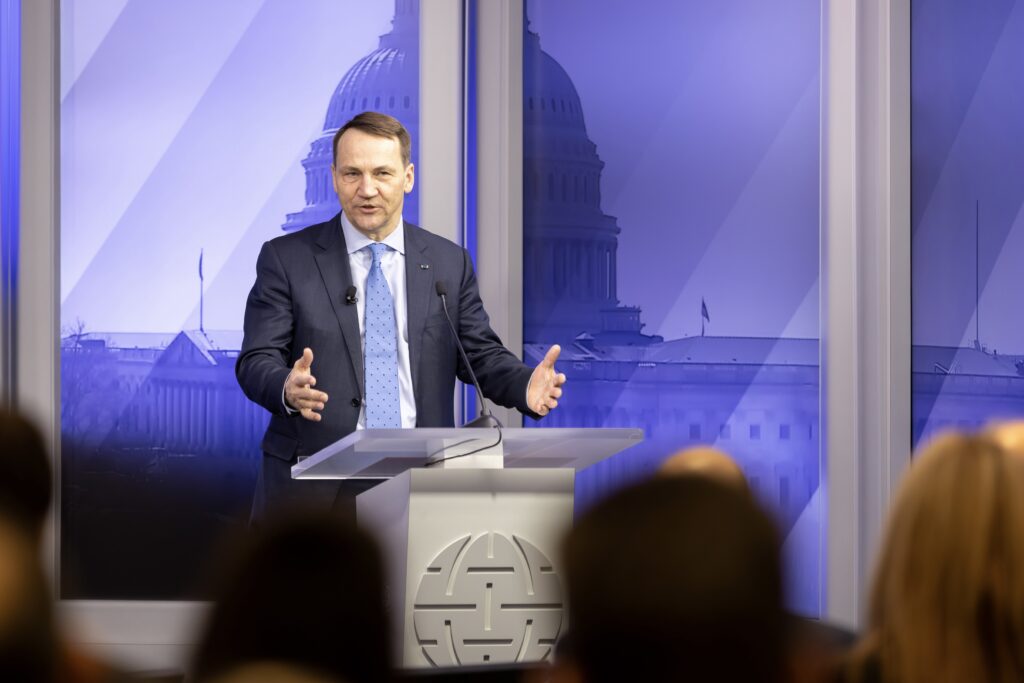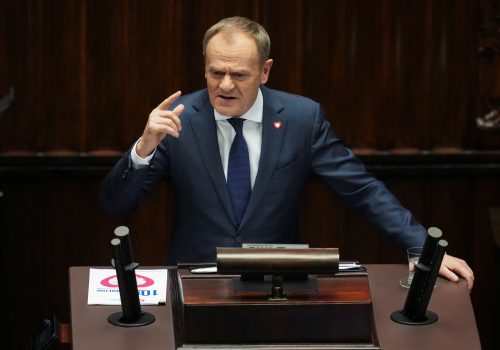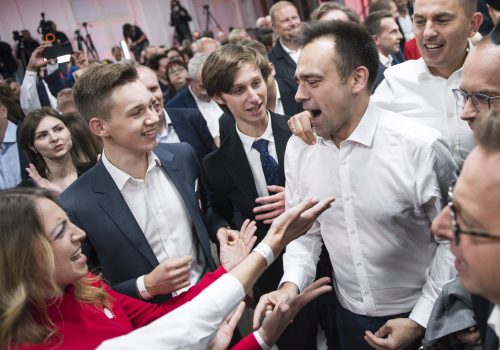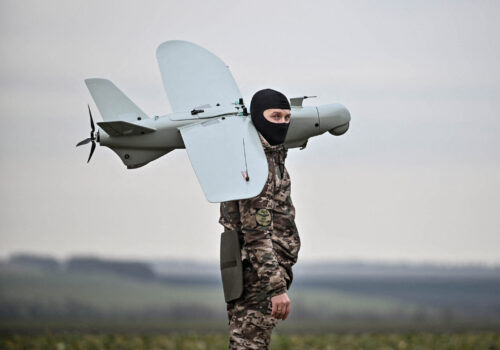On February 26, Polish Foreign Minister Radosław Sikorski spoke at the Atlantic Council, where he made the case for the United States continuing its support for Ukraine. His remarks as delivered are below.
Ladies and gentlemen, my heartfelt gratitude for the invitation. Thank you for sparing the time and the willingness to listen to my arguments.
I will be discussing issues of national interests, international alliances, how to beat dictators, win freedom, stability, and strength.
But let me start on a personal note.
Although I am Poland’s foreign minister, my wife, as some of you know, is American. But most of you may not know that our son is actually an American soldier. My heart and duty are therefore with Poland but my interest lies also in keeping America prosperous and confident enough to stay faithful to its allies.
As Fred [Kempe] already mentioned, I grew up in a Poland that was still a Soviet colony. After decades of struggle, we won our independence. Partly thanks to America, Poland has joined the larger family of democratic nations, and my own family has joined yours.
But not everybody celebrated our victory. In 2005, Vladimir Putin said that the collapse of the USSR was—and many of you know the quote—“the greatest geopolitical catastrophe of the century.” His invasion of Ukraine is part of an effort to restore the power and cruelty of what President Ronald Reagan called “the evil empire.”
But he is not alone. The murderous invasion of Ukraine is aided and abetted by a crime family of dictators from Iran, North Korea, but also lauded by, among others, those ruling Cuba, Venezuela, and Syria. Putin, in turn, helps his fellow despots fuel chaos in the Middle East, Asia, and here on your southern border. He welcomes Hamas in Moscow, and his propaganda supports the terrorists.
China helps Russia economically, and in turn benefits from cheap oil and gas that Putin is selling to fund his war machine. They all desire to destroy the stability of America and to create victory where it is not deserved.
We need to take these steps not to escalate the war in Ukraine but to prevent an even bigger global conflict.
All this is now under threat. The peace that we achieved after two murderous world wars, the taboos that we set, which was that you may not change borders by force. This is threatened, but we can still set it right.
There are only three steps separating us from a more secure and stable world. Take them together and we will prove we can stand up for our interests and defeat these dictators. Fail and we invite more thugs onto the world scene and this will have dire consequences. What are these steps?
First, back Ukrainians with the ammo they urgently need.
Second, invest in our security to create a deterrence so powerful that it dwarfs Putin and his cronies.
Third, deepen and widen our alliances to secure a lasting peace from a position of strength.
We need to take these steps not to escalate the war in Ukraine but to prevent an even bigger global conflict, which currently slides ever closer towards our borders.
In what follows, even if you contest some of the arguments that I make as a politician, please do not doubt that as a father I have no desire to see my son deployed to fight Putin’s aggression. I seek to deter and prevent it.
Ladies and gentlemen, many of you know that Winston Churchill once observed that: “You can always count on the Americans to do the right thing, after they have tried everything else.”
It turns out that sometimes even Churchill was wrong. When Putin launched his full-scale invasion of Ukraine, he thought America would show weakness. Instead, to my very pleasant surprise, America was the first to do the right thing and made sure Ukraine got the backing it needed. With Britain, actually. Poland also rallied round. The use of American intelligence to warn Ukraine and to deprive Putin of a casus belli was brave and brilliant and I’d like to salute the US intelligence community and the United States for this creative use of intelligence.
Then, the US—with overwhelming cross-party support—invested over seventy-five billion dollars, including forty-six billion in military assistance. This bipartisan effort should not be forgotten. And on behalf of—I think I can speak in this case—Ukraine, certainly Poland, and the European Union, I’d just like to say thank you, so far.
Inspired by US leadership, the European Union and its member states rose to the occasion, pulling together an even higher amount. I’d like this to be noted. We have contributed financially more: $92 billion already. Of that, $33 billion in economic and humanitarian support; $18.5 billion in supporting the refugees; and $10 billion in the form of grants, loans, and guarantees. Almost $30 billion in military support. And this month, the EU has already passed another fifty billion euro package. That’s real money.
This coalition of strength and solidarity is not limited to the US and Europe.
Democracies on the other side of the globe—Japan, South Korea, Australia, New Zealand—soon joined. They saw obvious parallels in Russia’s invasion of Ukraine and the assertiveness of China.
And it’s been a good, sound investment. The Ukrainians fought back and retrieved 50 percent of the lands once occupied by Russia.
And then they liberated—In the liberated areas, what they have witnessed made them even more determined.
Putin’s army, as you know, left behind towns and villages full of atrocities—atrocities that we thought belonged to the twentieth century in Europe. Mutilated bodies were scattered on the streets of Bucha and Irpin, just fifteen miles from the heart of the Ukrainian state. Victims of rapes and indiscriminate bombardments, including pregnant women in maternity hospitals.
And on top of all that, the systemic, mass abduction of tens of thousands of children from their families to forcibly turn them into Russians.
This is what Putin has in mind for Ukraine as a whole. He seeks to oppress an entire country with a prewar population exceeding forty million people and the territory the size of Utah, Nebraska, and Missouri combined.
Unless he is stopped—he will continue his march of cruelty.
Russia may have suffered over 350,000 casualties, both dead and wounded—but in a dictatorship, human life is cheap. Putin has crushed dissidents, murdered Alexei Navalny, moved the country’s economy to a war footing, boosted production of artillery shells. And around the clock, Russia has started building more factories and running its existing plants on triple shifts.
During my last trip to Kyiv in December, Ukrainians described how the invaders were so much better equipped, that they fired eight artillery rounds for every one that the Ukrainians can muster. That’s not a way to win.
Putin isn’t working alone. Today, many bombs falling on Ukrainian schools, churches, and apartment blocks come in the form of Iranian drones and hypersonic missiles with microchips smuggled through other countries. Most recently, North Korea has sent long-range weapons to sow more terror among civilians.
This mix of terrorists and dictators are united by one thing—their hatred of America, the West, and of democracy. Hatred fueled by fear.
They’re hungry to show that the US is weak, ineffective, and hopelessly divided. That America can no longer act effectively, or be a force for good in the world.
Ukraine is a test case for them. All are eagerly watching to see if Putin can crush freedom—and our resolve.
The invasion of Ukraine is by no means a regional squabble. It is a war with global consequences.
If we choose to abandon Ukraine, or do it by default, Putin will come to understand—as will other adversaries around the world—that he can get away with whatever he wants.
He will push up much closer against the borders of NATO states, threatening further military incursions in Europe where our children will have to fight him. After all, Putin has openly stated that the Russian border “doesn’t end anywhere.”
Losing to him will open the gates to more chaos, more instability, more wars.
Putin has a great weakness. He attacks only when he thinks he can get away with it.
Americans, more than anyone, apparently, understand this.
A poll conducted last October found that 84 percent of US voters believe that the Russian leader is a threat to American interests. They are right.
In the same poll, 71 percent said that Ukraine should win the war. They are right.
And 68 percent said that a Russian victory over Ukraine would make the world less stable. Again, they are absolutely right.
Americans from across the country, both Republicans and Democrats, all agree that Putin should be defeated.
Ladies and gentlemen, I realize that appeasement may seem an easier path but it is in fact a dead end.
If America cannot come together with Europe and enable Ukraine to drive Putin back, I fear that our family of democratic nations will start to break up. Allies will look for other ways to guarantee their safety. They’ll start hedging. Some of them will aim for the ultimate weapon, starting off a new nuclear race. I’m thinking of the Far East.
But this can all be stopped.
Putin has a great weakness. He attacks only when he thinks he can get away with it. He shrinks in the face of strength, willpower, and credible deterrence.
Here’s just one example.
At the start of the war, Russian warships illegally blockaded Ukraine’s ports, stopping Ukrainian grain from sailing to feed the world.
But, supported by American investment, the Ukrainians pioneered the use of sea drones. And these zip unseen across the waters of the Black Sea to strike at Putin’s warships. And apparently, 25 percent of this once mighty fleet has now been disabled by a country without a navy.
Ukraine’s grain exports via the Black Sea have almost returned to prewar levels.
When American and European investment is combined with Ukrainian innovation and courage, Putin retreats. He’s had to withdraw some of his ships from Sevastopol to ports further afield, where he can’t strike at the grain ships. Let’s help Ukraine become his nemesis.
The first step to defeating Russia is to immediately supply Ukraine with the ammo they urgently need.
Many American are asking—at what price? Well actually, quite low.
Over two years, the United States has contributed roughly 5 percent of an American annual military budget in security assistance. And with that money, Ukraine has already managed to destroy Putin’s combat capacity by 50 percent. Without any American troops firing a single shot. A truly stunning return on investment.
And most of this money is spent here in the United States. According to some analyses up to 90 percent goes directly to create American jobs on American soil.
Researchers at the American Enterprise Institute, I realize the competition, have identified—and I quote—“117 production lines in at least 31 states and 71 cities where Americans are producing major weapons systems for Ukraine.” You can find them in deeply blue states like California, deeply red states like Mississippi, and purple states like Pennsylvania or Ohio, where Abrams tanks are made, which Poland, for example, is also buying.
Much of the newly made equipment ends up not in Ukraine but in the hands of American soldiers. It replaces stockpiles of older weaponry already sent to help defeat Putin’s invasion.
American investment in Ukraine’s capacity to defend itself is a literal proof that “by helping others you help yourself.” Helping Ukraine is not only a good deed. It’s also a good deal.
At this moment, only America has the military capacity and might to enable Ukraine so that she can survive this dangerous moment. This urgent action is a life-saving bridge.
On the other side, the nations of Europe are ramping up to build a deterrence that together with America can contain Putin in this long run—in the long run. Actually in the medium term. But this year is crucial. And this year, we cannot do without America.
This is the second step to victory.
Let us imagine a scale of investment in security that dwarfs Putin and other dictators. And we can afford it much more than he can. The production vital for our security should be based in America and among allied nations. This “friendshoring” will ensure that we are not, as we are now, at the risk of supply chains that rely on our adversaries, and which could subvert at any vital moment.
This is the path to security in the twenty-first century. We should be driving it forward together.
Ladies and gentlemen, over the years, subsequent presidential administrations have expressed their exasperation with European countries for not sharing an equal burden of defending freedom and maintaining peace around the world.
But here’s some good news. We heard you and it is now happening.
In recent years, many European countries have increased their military budgets, some of them significantly. My country, Poland, has doubled its defense spending to almost 4 percent of GDP. And we were 2 percent for fifteen years before that. I believe we are now, actually, in percentage terms at the top of NATO members—including the US.
Where are we spending the money? Well, between 2018 and 2022, 56 percent of what we’ve contracted is due to come from the United States. We are buying Abrams tanks as I’ve already mentioned, HIMARS launchers, F-35s, Patriot batteries, Apache helicopters, and many others.
The contracts recently signed add up to thirty-four billion dollars. I’m told that since the full-scale invasion of Ukraine, Europe as a whole has placed ninety billion dollars of fresh orders in the United States.
Other European countries that donated their weapons to Ukraine are, as I’ve said, replenishing their stocks with American gear, thus creating another stream of money that flows to the American people, including the American middle class. We are also re-building Europe’s defense industrial base.
This trajectory needs to continue. Putin and his henchmen must realize they can neither outproduce or outlast us.
Together we are much stronger than the enemy. Our collective GDP is vastly greater than Putin’s.
The numbers speak for themselves. We have the drones, we can have the ammo, we have the money, too. All that is needed to win is our will to act.
Only if we remain determined, can we take the third step to victory and achieve peace through strength.
We have done it before.
In 1999, exactly a quarter of a century ago, Poland was invited to join NATO and the transatlantic family.
Twenty-five years later, not least because of the security guarantees that NATO provided us, we have become the fifth largest economy of the European Union, and the main buyer of US military equipment as I’ve already mentioned.
Victorious Ukraine may follow a similar path.
Ladies and gentlemen, whether we want it or not, Putin’s decision to start the biggest war in Europe since the defeat of Nazi Germany has already changed the course of history. It is up to us to decide if we want to shape that course ourselves, or let it be shaped by others—in Moscow, Tehran, or Beijing.
Helping Ukraine by defeating Putin is the right thing to do in the broadest sense of the word.
It is morally sound, strategically wise, militarily justified, and economically beneficial.
It outweighs politics. It transcends partisanship.
Now is the moment to act. Let’s get this done. Thank you.
Watch the address
Further reading
Tue, Dec 12, 2023
New Polish PM Donald Tusk vows “full mobilization” of West to help Ukraine
UkraineAlert By Peter Dickinson
Poland’s newly appointed Prime Minister Donald Tusk has vowed to rally Western support for Ukraine as it continues to defend itself against Russia’s ongoing invasion, writes Peter Dickinson.
Sun, Oct 15, 2023
Did Polish voters just set a new course toward centrism?
New Atlanticist By Daniel Fried
Preliminary election results suggest that the ruling right-wing nationalist Law and Justice Party may be ousted in Poland. Here's what the results mean for the EU, Ukraine, and more.
Tue, Feb 20, 2024
Outgunned Ukraine bets on drones as Russian invasion enters third year
UkraineAlert By
As Putin's invasion passes the two-year mark, tech-savvy Ukraine is betting on drones as the best way to overcome Russia's increasingly overwhelming advantage in traditional firepower, writes Mykola Bielieskov.
Image: Polish Foreign Minister Radosław Sikorski speaks at the Atlantic Council on February 26, 2024. Credit: Konrad Laskowski / MSZ



